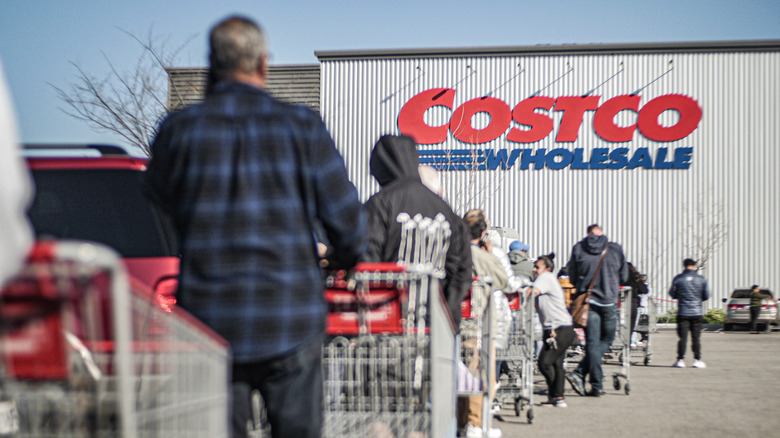Costco Is Warning Shoppers Not To Fall For These Online Scams
Scams concerning Costco have proliferated recently. Currently, according to Costco's listing on its website, 14 of them are at play. The scams consist of a few subgroups. There are the fake satisfaction surveys, one of which is a straightforward survey while another promises to enter the respondents into a sweepstakes with $500 prize. There's a third one that presents exclusive Costco offers and a fourth boasts a free TV for all who comply.
After that, there are the texts informing you that your $101 loyalty reward has shipped, offering overcharge reimbursements, or enticing you with direct deposit for cashback rewards. There are also fake rewards or gift card redemption and an exclusive giveaway.
On the more devious end, there is a scam that pretends to have $130 in a coronavirus stimulus for Costco's members and a fake job interview that probably preys upon people suffering from the uptick in unemployment. On the more over-the-top end, there is a fake Facebook post purporting to give everyone who shares it a Christmas box containing $250 worth of groceries and a $35 Costco voucher and a fake raffle winner announcement that tells people they won $460,000 with $6,994.92 as their first payment (via Costco).
Obviously, that is a lot of information. However, familiarizing yourself with the pictures Costco has shared of each scam, as well as employing a certain degree of skepticism, should steer you straight.
Online scams have surged during the pandemic
Between 2019 and 2020, the Better Business Bureau had seen a 24.9% increase in the number of online scams. In its report, the BBB explained that factors caused by the coronavirus pandemic, such as the increase in online shopping, had led to more online purchase and employment scams. Other factors that would raise one's susceptibility were the feelings of financial distress, loneliness, and the natural panic of stressful situations, like the pandemic. Conversely, those who have trust in getting information from government institutions and those who asked questions about strange messages tended to lose less money.
The Ottawa Citizen gives the more concrete example of a woman who ordered reusable masks on Amazon in April 2020 and waited until June as the company continuously claimed to have supply issues. While it may not have been a scam, she granted, "I never got my money back, I never got the masks, and the company never contacted me again after I tried to contact them sometime in July." The example highlights, however, the ways that scammers can slip behind respectable faces, especially during the upheaval that has marked the previous year.

